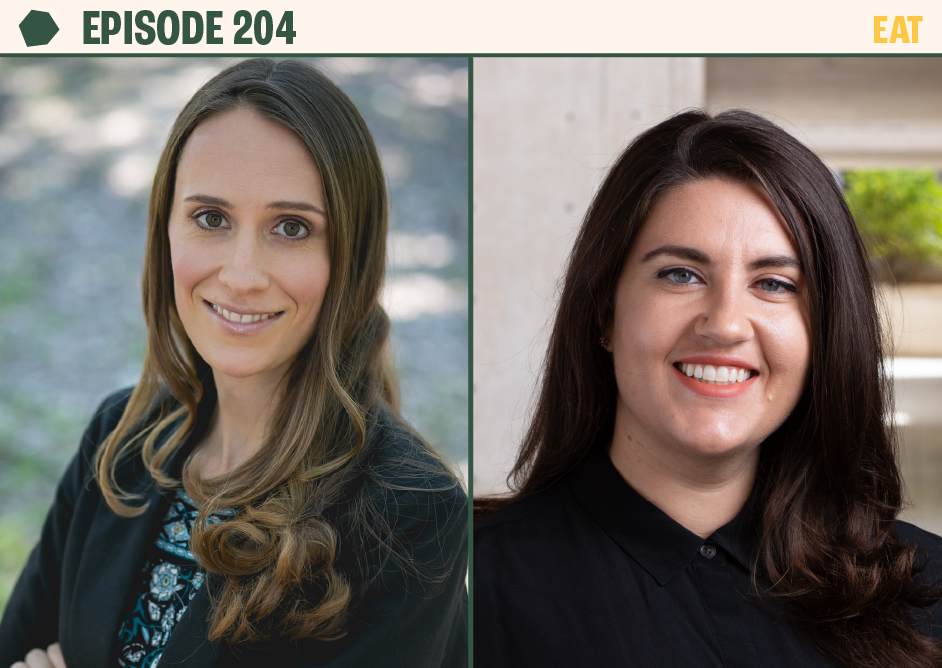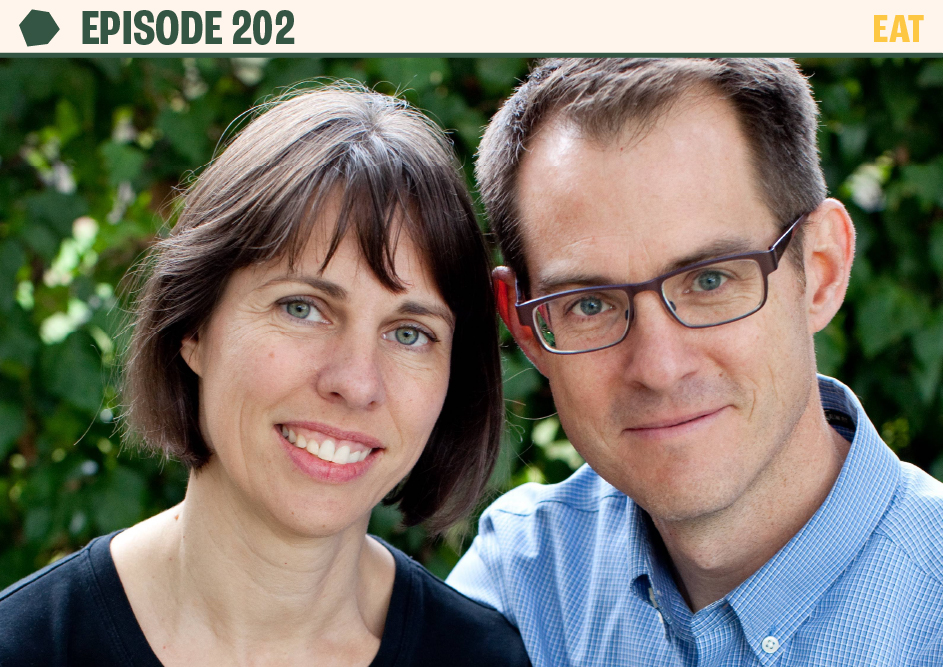In Episode #204, I’m joined by leading researchers Dr Emily Manoogian and Dr Courtney Peterson. Drs Emily and Courtney both research how food timing interacts with the body, focusing on time-restricted eating (TRE).
TRE (a form of intermittent fasting) has caused a media frenzy in the past few weeks, with many major news outlets reporting on a recently published study from China. As we know, these reports often present studies in absolutes, excluding the full picture and ruling out nuance. This study has been interpreted and reported differently, causing confusion for people without extensive knowledge in the field.
Dr Emily Manoogian and Dr Courtney Peterson sit down with me in this episode for a comprehensive deep dive into time-restricted eating, clarifying the questions many people have. As two leading, experienced researchers with significant knowledge in the field, they offer considered and contextual insights beyond the black-and-white recaps you might see in media outlets.
Dr Courtney Peterson is an internationally recognised researcher in the field of intermittent fasting. She has been involved in a number of breakthrough TRE studies, and her work has been featured in more than 50 media outlets across the world. Separately, Dr Emily Manoogian studies the intricate interaction between our body’s biological rhythms and the timing of our daily habits (sleep, eating, and exercise). She has been researching circadian rhythms for 14 years, and for the past 6 years has focused on time-restricted eating. Her work is widely recognised, having published 22 scientific articles and been referenced more than 1155 times.
In this episode, we approach the topic with a key question: is there any advantage of time-restricted eating other than helping people eat fewer calories to achieve a healthy body weight? You’ll learn the specifics of what TRE is, the purported benefits, what we know, and what we’re yet to discover. We also discuss TRE and longevity, emerging research on TRE and the treatment of certain cancers, and comment on the recent study from China that is making waves.
Specifically, we cover:
- Intro [0:00]
- Debate of Fasting Benefits [2:11]
- Fasting Defined [6:20]
- Circadian Rhythm & Meal Timing [17:26]
- History of TRE Studies [25:32]
- Calorie Restriction vs TRE [46:29]
- Debunking Trials that DIDN’T work [58:27]
- Cancer [1:25:40]
- Aging [1:31:56]
- Women’s Health & Lean Muscle [1:35:37]
- Optimal Eating Windows [1:41:55]
- Training & Breaking the Fast [1:48:36]
- Shift Workers [1:55:15]
- Longevity & Protein [2:02:13]
- Outro [2:04:33]
I hope you find this episode informative and clarifying. Drs Emily and Courtney’s immense knowledge on TRE brings a well-rounded perspective to the topic, a perspective that is backed by evidence and years of research.
You can learn more about Dr Courtney Peterson here. To connect with Dr Emily Manoogian, you can do so via Twitter, LinkedIn, or her website.
The best way to support the show is to use the products and services offered by our sponsors. To check them out, and enjoy great savings, visit theproof.com/friends.
Enjoy, friends.
Simon
More about Dr Emily Manoogian
Emily Manoogian, Ph.D. is a staff scientist at the Salk Institute who studies the intricate interaction between our body’s biological rhythms and the timing of our daily habits. These internal rhythms interact with our daily behaviors of when and how much we sleep, eat, and exercise. As the head of human research in Dr. Satchin Panda’s lab at Salk, Emily investigates how the timing of these behaviors relates to health.
Dr. Emily Manoogian has been researching circadian rhythms for 14 years and clinical trials specializing in cardiovascular and metabolic health for the past 6 years. She started her research as an undergraduate at the University of California Berkeley (UC Berkeley) working with Dr. Lance Kreigsfeld. From there, she did her Ph.D. in Neuroscience at the University of Massachusetts Amherst (UMass Amherst) with Dr. Eric Bittman. There she studied the molecular and behavioral mechanisms of a circadian mutant known as duper that can adjust to new timezones overnight. In 2016, Dr. Manoogian joined Dr. Satchin Panda’s lab at the Salk Institute for Biological Studies as a postdoctoral research fellow and transitioned to clinical research. Here the main focus of her research has been Time-Restricted Eating. She has led many of her own clinical trials and collaborated with other researchers around the world. In 2021 she became a staff scientist at the Salk Institute and is continuing to pursue her goal of understanding how to optimize circadian rhythms to improve health.
Dr. Manoogian has published over 22 scientific articles and has been cited 1155 times. She has shared her work internationally at conferences, public outreach events, podcasts, news outlets, including BBC, and two TEDx talks (TEDxSanDiego and TEDxGateway).
More about Dr Courtney Peterson
Dr. Courtney Peterson is an internationally recognized researcher in the field of intermittent fasting. Her research focuses on daily intermittent fasting, which is also known as time-restricted eating. Dr. Peterson conducted the first controlled feeding trial of intermittent fasting in humans and was the first to test early time-restricted eating (eTRE) in humans, a version of TRE that involves eating early in the day to be in alignment with circadian rhythms in metabolism. Her research established that eTRE can improve insulin sensitivity, glucose levels, blood pressure, and oxidative stress, even in the absence of weight loss. She also demonstrated that eTRE does not affect energy expenditure but does affect fat oxidation, metabolic flexibility, and appetite hormones, including ghrelin, leptin, and PYY. Further, her research has established that eTRE affects molecular pathways involved in longevity and autophagy. Currently, she is the PI, MPI, or site PI of seven clinical trials on time-restricted eating and serves as a co-investigator or consultant on another five clinical trials. She currently is the PI of the largest randomized controlled trial of intermittent fasting in humans—a 344-person study in adults with type 2 diabetes. As secondary interests, she also performs mathematical modeling of body composition and metabolic data. For instance, her research showed that the tri-ponderal mass index better estimates adiposity in adolescents than BMI. Her research has been featured in more than 50 media outlets, including NBC Nightly News, The New York Times, The Washington Post, Wall Street Journal, Good Morning America, the BBC, and Scientific American, and has reached a circulation of more than 104 million people around the world.
Supporting studies
- Effects of caloric intake timing on insulin resistance and hyperandrogenism in lean women with polycystic ovary syndrome PMID: 23688334
- High caloric intake at breakfast vs. dinner differentially influences weight loss of overweight and obese women PMID: 23512957
- Fasting until noon triggers increased postprandial hyperglycemia and impaired insulin response after lunch and dinner in individuals with type 2 diabetes: a randomized clinical trial PMID: 26220945
- Early Time-Restricted Feeding Improves Insulin Sensitivity, Blood Pressure, and Oxidative Stress Even without Weight Loss in Men with Prediabetes PMID: 29754952
- High-energy breakfast with low-energy dinner decreases overall daily hyperglycaemia in type 2 diabetic patients: a randomised clinical trial PMID: 25724569
- Early Time-Restricted Feeding Improves 24-Hour Glucose Levels and Affects Markers of the Circadian Clock, Aging, and Autophagy in Humans PMID: 31151228
- Early Time-Restricted Feeding Reduces Appetite and Increases Fat Oxidation But Does Not Affect Energy Expenditure in Humans PMID: 31339000
- Time-restricted eating effects on performance, immune function, and body composition in elite cyclists: a randomized controlled trial PMID: 33308259
- Four Weeks of Time-Restricted Feeding Combined with Resistance Training Does Not Differentially Influence Measures of Body Composition, Muscle Performance, Resting Energy Expenditure, and Blood Biomarkers PMID: 32316561
- Time-restricted feeding improves blood glucose and insulin sensitivity in overweight patients with type 2 diabetes: a randomised controlled trial PMID: 34620199
- Randomized controlled trial for time-restricted eating in healthy volunteers without obesity PMID: 35194047
- Two weeks of early time-restricted feeding (eTRF) improves skeletal muscle insulin and anabolic sensitivity in healthy men PMID: 32729615
- Eating breakfast and avoiding late-evening snacking sustains lipid oxidation PMID: 32108181
- Effects of Time-Restricted Eating on Weight Loss and Other Metabolic Parameters in Women and Men With Overweight and Obesity: The TREAT Randomized Clinical Trial PMID: 32986097
- Calorie Restriction with or without Time-Restricted Eating in Weight Loss PMID: 35443107








